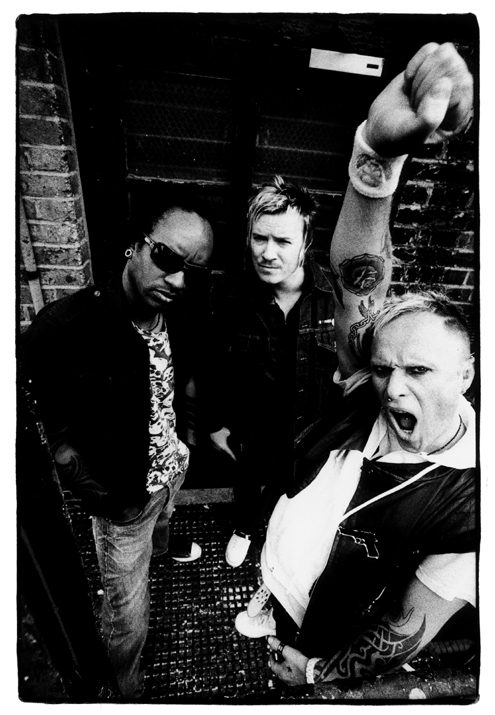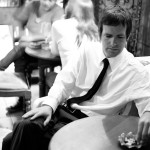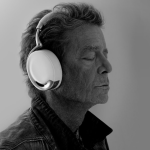
[Photo by Steve Gullick]
By Andrew Parks
When self-titled reaches Liam Howlett at a top-secret recording studio somewhere in England, we’re expecting him to be nothing but hurried and hasty. After all, the Prodigy producer just launched–as in five minutes ago, literally–a long-planned new Web site for the group’s first studio record since 2004’s Always Outnumbered, Never Outgunned. The perpetually-delayed album was slammed for the sudden lack of longtime Prodigy MCs Keith Flint and Maxim Reality, frontmen of sorts that helped give a face to the Prodigy when they topped the Billboard charts and went double platinum with 1997’s The Fat of the Land. (See such breakthrough singles as “Breathe” and “Firestarter.”) Replacing Flint and Reality with such guests as Princess Superstar and Juliette Lewis certainly didn’t help matters among the cynical. Not when we’d been sold on the Prodigy as a dance/electronic music band years ago, when the trio (and since departed dancer Leeroy Thornhill) stormed the States with such early breakbeat/rave-era jams as “Their Law,” “Out of Space,” “Poison,” and “Charly.”
Anyway, back to Howlett, who’s actually not stressed at all. If anything, he sounds like a producer with a purpose: returning the Prodigy to their midstream, festival-headlining roots, where the music sounds underground as hell but punches speakers harder than an arena-ready rock track. We spoke to him for nearly an hour about the new album (well, bits and pieces about it as he’s being quite secretive), the preposterousness of ‘electronica’ as a concept, and why he thinks Justice deserves all that hype.
“Breathe”
[youtube=http://www.youtube.com/watch?v=3kbW4ibIF8U]
self-titled: So I realize you’re busy finishing your next album right now, but when can we expect seeing you in the U.S. again?
We were actually going to play South by Southwest and a couple of other gigs [this year], but the album is taking longer than we expected as usual. So basically it’ll happen when the record’s out.
You were going to play South by Southwest? That would have been great considering the only major dance music artists there was Moby and he was only DJing.
Yeah, we were going to do it and a tour around it, but we decided to finish the record instead.
Right on. Well, one major theme I’d like to discuss with you is your thoughts on dance music’s role in the U.S. right now, and whether or not it reflects the promises set forth by ‘electronica’ back when you first broke through to the States. What was your first tour here, actually, and how did it go?
Terribly, actually. We had signed to Elektra quite early on and we did a tour with Moby around the time he put “Thousand” out. (In 1992, Moby released the single “I Feel It/Thousand,” the B-side of which features a record-breaking, 1,000-beats-per-minute song.) One night we would headline, and the next Moby would headline. It was cool, you know? We had a great time. After all, we were four 19-year-old guys on a tour bus, over there for about five weeks. It was a classic rock ‘n’ roll tour, going across America.
You got to remember that the rave scene in England was at its peak around that time, so it was weird coming from a country where [dance music] was massive to America where we had to show people ‘what we’re doing.’ Some people got it and some people definitely were like, “What the fuck?” We’ve always been misunderstood, though. We kinda like that, you know?
Well the important distinction to make, then, is that dance music never did quite hit its peak here, right?
It was natural the way it happened in England. And I can see how that was exciting to some people, as it was kinda this above the law type thing of doing something really different. People wanted that to happen in America, but it just didn’t happen as quickly or as smoothly as people wanted it to.
From your perspective, didn’t it happen naturally in England because dance music was so embedded in youth culture, from the music to the parties to the clothes?
Totally. It was my way of life for at least three years–starting around ’89, the start of the rave scene here. After ’92, it started to fragment as the police and the Criminal Justice Bill came in and the music moved from [the warehouses] to the clubs. When it went into the clubs, you’d have to go to specific ones to hear certain kinds of music, whereas at the raves you could hear drum ‘n’ bass, house and breakbeat music all in one place. I myself was particularly bored with that stage, so it was time for us to reinvent ourselves. It wasn’t calculated; it was something I wanted to do after doing what seemed like the same thing for ages. That was when we started doing gigs at more rock ‘n’ roll type venues and the people who wanted more of an aggressive sound came to us.
So by the time [Music For a] Jilted [Generation] came out, you were playing rock venues?
Yeah, because they were better venues with better sound systems. We went back to basics, man. In ’90, ’91, we were playing to 20,000 people at raves. In ’93, ’94, we went back to playing for a thousand people at colleges and stuff like that. It was like the band was starting over again–our second phase.
“Firestarter”
[youtube=http://www.youtube.com/watch?v=28ow4TLMTqM]
What was the tipping point for the Prodigy, at least in the U.K.? You took off soon after your first white label (Earthbound 1), right?
A little while after that, basically. I remember Carl Cox playing with his three decks, and having “Everybody In the Place” on the third deck for about a half hour, always ready to jump in. I don’t claim to have started breakbeat culture, but I definitely feel like we were part of that change [from acid house]. Since there weren’t a lot of bands then, we pushed ourselves forward as ‘this ballsy band from Essex’–proper ravers, though, going to all the parties and staying up all night.
You must have hated when British journalists declared your music “kiddie rave,” though, especially when other artists started imitating that style.
Those were the sheep, the ones who saw the success of a single like “Charly” and tried to copy it. That’s when I decided to get out of it. I was never embarrassed by the records I made, but I remember a specific gig in Scotland where I was onstage and felt like, “Fuck it, I want to go home right now and do something else.” The beginning of 1993 was probably the turning point.
You brought up a good point a few minutes ago. When I first went to England, I was struck by how fragmented your record shops were. It was as if house alone was split into six different sections. Yet in the U.S., we pushed for the opposite: lumping all these subgenres, and subgenres of subgenres, under the umbrella of electronica. Aren’t both of those lines of thought extreme?
Maybe. I mean, no one wants to be pigeonholed. I can only talk about what happened in England. When it became fragmented, I felt like things really changed. But things had to change, you know? Different beats, different sounds, and different tempos are how you keep this interesting, how you keep yourself inspired.
“Out of Space”
[youtube=http://www.youtube.com/watch?v=u7edztkuz5o]
So in the early ’90s, were you finding more inspiration in the records you sampled than your actual peers?
Definitely. I always looked back to funk and rare grooves because that’s [the basis of] breakbeat: the whole song is inspired by the groove.
You were originally involved with hip hop and more of a B-boy lifestyle. What made you move away from that to dance music? Was race a major issue?
At the time, hip hop in London didn’t have a lot of white people [involved with it]. The only reference point would have been the Beastie Boys’ first record and it was seen as more of a crossover record than a hip-hop record. It wasn’t fun for me. After three or four visits to some rough venues, and standing in the corner watching everything, I thought, “Fuck it. I love this music but …”
So I saw my friend on the train and he said, “You’ve got to come with me to this club, man, it’s gonna be amazing.” I went that night and that was it for me. [Dance music] had the energy and the attitude of hip hop but it had a different atmosphere. I liked the togetherness of it all.
One thing people seem to forget is that dance music got its start here in the ’80s, beginning with the house and techno scenes of the Midwest. Yet that music never quite crossed over to the mainstream like hip hop did during the same time period. Why do you think this happened? Why do you think dance music stuck closer to the underground?
Hip hop music is so ingrained in street culture that the majority of the youth and black communities can relate to how hip-hop artists express themselves. Dance music never had a chance to be on the same level as hip hop. And it shouldn’t be, really. They’re both where they should be. People forget that dance music isn’t really about expression. It’s about escapism; it’s more hedonistic. There’s different degrees of escapism, though. I’m not into trance and all the stuff that goes with that, for instance.
Some of this is changing now, though, ever since hip hop discovered Ecstasy and the buzz of faster beats. So the two things have amalgamated, at least in America. In England, the street kids are definitely putting rhymes on faster dance beats that have little to do with traditional hip hop.
Is grime still doing well in the U.K. or has it hit its peak to some degree?
Dubstep seems to be the new thing right now. It’s really exciting–seeing these drum ‘n’ bass guys bring their tracks down to slower tempos. That’s fresh again, man.
Going back to your point about hip hop, is that the role dance music is going to play in the U.S. in the future–as more of an influence or a deliberate, obvious sample element than as specific dance artists or songs?
The question is do we want dance music to elevate itself? Do we want it to become mainstream? No. I don’t, at least. Dance music is meant to be underground and in the clubs–where people are taking drugs and escaping. No one said, “Hey, why isn’t the ’60s garage scene taking off?” for the same reason. Because it belongs in the underground, as a movement there … and the same thing goes for dance music.
Wasn’t there a considerable controversy in the ’90s over Moby putting his face out there more, since the British rave scene was a faceless movement overall?
Which particular era of Moby?
Around the time of Everything is Wrong.
Yeah, that didn’t go over very well; it didn’t wash with people like us. We’re all guilty of putting our songs in films and adverts but there’s a level of integrity you need to keep. I’m not sure there was an actual controversy over Moby, though. If anything, Moby’s always tried to do something different, to branch out and change what he’s doing all the time. He’s riding on the more commercial end of dance music, though, so I’d love to hear him go back to the underground at some point.
Yeah, I mean some of his songs were so pivotal in the development of dance music.
After you’ve been through that kind of success, it’s all about what you want out of music. Your goals and boundaries change. Like with us, I don’t want our music to be just in the underground. I listen to underground music, but I want a record that’s big and can be played at festivals because that’s what we’re about. The Prodigy is for the masses.
“Poison”
[youtube=http://www.youtube.com/watch?v=2i_pkJZbCv4]
So are we going to hear a dubstep track on this new record?
[Laughs] A lot of that sound is great but I’m not going to rip it off.
This wouldn’t be a Prodigy interview without talking about the Fat of the Land era. How do you feel about that time period in retrospect?
It all changed when MTV got behind us with the ‘electronica movement’ or whatever you want to call it. Things changed for the better, then. Hype or not, we had already proved ourselves by being at it for five years or whatever. As for how people took us, we were more of a band or gang than, say, the Chemical Brothers. We had more of a presence and image live. I’m not disrespecting the Chem’s, though; them, Underworld, Daft Punk, us, we all moved in slightly different directions in our own way. No one copied anyone else. We were all pioneers on our own track.
What did you honestly think about how electronica was packaged by the media here?
It’s easy for me to understand why that had to happen now, but at the time, we were pretty disgusted by it. Like, “What the fuck? Just let it be man, whatever it is. Don’t pigeonhole us.” At that time, we weren’t championing electronica and didn’t care if it broke or not. We just wanted to play America and cared about whether we broke or not. It was like, “Lollapalooza? Us? Wicked.”
Getting over here to play more shows must have been crucial since that’s a major part of getting the whole Prodigy package.
Yeah, I hear Justice is doing really well over there. Which is great news to me. They are one of the most exciting dance acts right now. When you’re dealing with Justice, you’re dealing with pure quality. Daft Punk may be the grandfathers of this, but Justice is doing something different. They’re great guys.
I could see you liking them, what with how aggressive their sound is.
Totally, but it’s sick as well. It’s not immature or juvenile-sounding; it’s dirty, nasty and slick. They’re the leaders of the new-wave.
Is the whole ‘nü-rave’ scene still going strong in England?
It was all a bit of a joke, started by the Klaxons: “It’s not new-wave, it’s nü-rave.” It’s gotten out of hand, though. Certain bands out there are definitely great at being imitators but not at pushing forward enough.
“Charly”
[youtube=http://www.youtube.com/watch?v=XH7xdFUwAVY]
Now I know you want to keep the new record ‘top secret’ or what not, but can you share some details with us?
Well I have the album title, which I can’t tell you. And I’ve got the song titles, which I can’t tell you. I want to talk to you about it, but it’s not the time, really.
Well tell me one thing: Are the tracks quite varied in terms of their mood and tempos?
Pretty all over the place, yeah, with one thing in common: They’re all going to be played live. It’s definitely a more exciting sounding record than the last one. That was more of a solo project because it was what we need to do at the time. This one is definitely geared to going back [to our roots] a bit.
Did touring behind your greatest hits collection force you guys to get along again?
Definitely, although our initial reaction was, “Fucking hell. No, no, no. We want to do a new album.” It was good in the end, though. It drew a line in our career, where we could leave our label and everyone was happy. It really cemented the band back together, where we felt like we had more to give.
What were those shows like? Did they remind you that you still have a strong audience here in the U.S.?
They were great, especially the last response we had at Coachella [in 2005]. It was probably the best response we’ve ever gotten in America. It was like old-school England before we went onstage, where it felt absolutely electric.
One last thing, Liam: Can we expect a new record this year, or are you just going to repeatedly delay it like you did with the last one?
Nah, man, no. [Laughs] Now that we’re speeding up again, I reckon I have three more months [of work left] and then we’ll have it out later this year.

